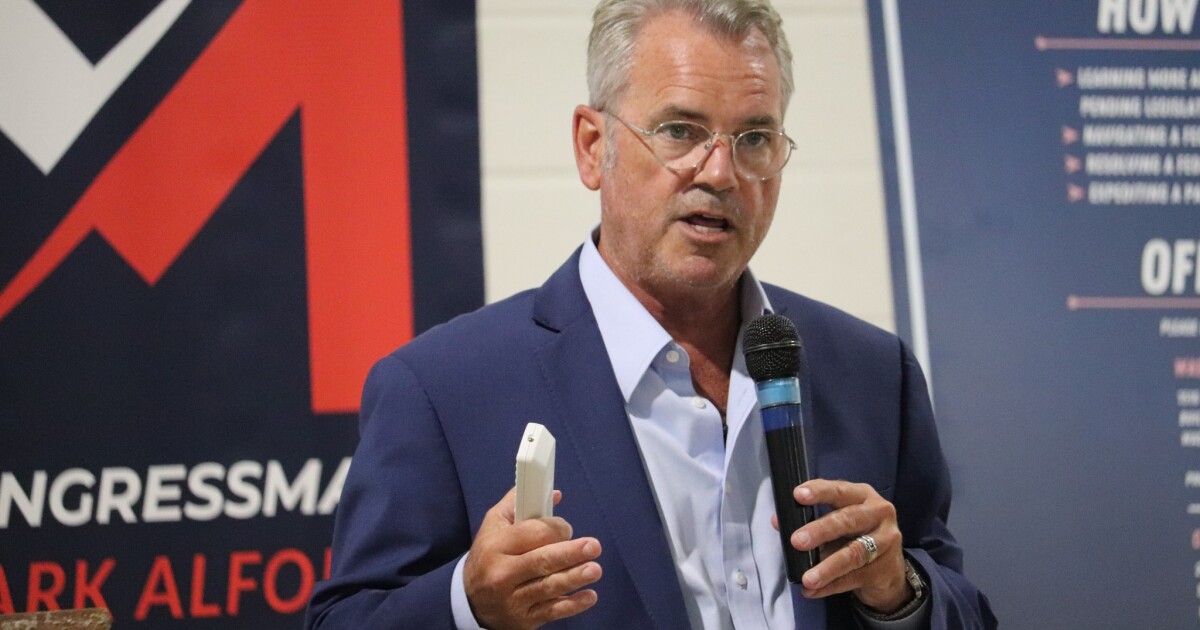Politics
Missouri’s senior property tax freeze has unanswered questions

Last year, the Missouri General Assembly scrambled to act on an issue popular with voters who turn out in large numbers: property tax cuts for seniors in the form of a tax freeze.Lawmakers passed a vague directive letting counties freeze property tax bills for seniors, without defining what “senior” meant, who was going to tell the counties how to define that group or how to pay for the change.Now, feeling pressure from constituents, county expenses are piling up. And with the Statehouse functionally useless as senators eye upcoming elections, clear directions aren’t coming anytime soon.“We have no idea what to expect,” said St. Charles County Commissioner Mike Elam. “We’re going down a road blindly, and we’re trying to make the best-educated guesses that we can.”The biggest Missouri counties with the most dollars to spare are spearheading the change. But with more questions than answers, small counties are waiting to learn from the larger population centers.In line with national trends, Missouri’s population is skewing older. Estimates from the U.S. Census Bureau found that by 2030, more than 25% of Missouri’s population will be over 60. Senior citizens in Missouri are expected to increase 87% from 2000 to 2030.Data compiled by the Missouri Census Data Center found that 7% of senior households in Missouri fell into the “cost-burdened” category from 2012 to 2016, meaning they spent 30% or more of their gross income on housing.How much progress have counties made?All of Missouri’s largest counties have passed ordinances that will eventually freeze real property tax bills for Missourians over 62.Without clear direction from lawmakers in Jefferson City, some versions look different than others. Counties will ask residents to apply again on a yearly basis, but a few details on that application process will be streamlined.Jackson County is accepting applications for the program. Officials included a home value cap of $550,000, so residents with home values over that figure won’t be eligible for the freeze. Taxes will freeze at the 2024 rate, with the first credits to be seen by residents in 2025. In Clay County, applications for the freeze will open in 2025.St. Louis city and St. Louis County followed a similar model and added home value caps of $500,000 and $550,000, respectively. St. Louis County stated on its website that without additional funding to handle the lift of putting the freeze in place, the program won’t be available this year.But under revisions to the law, which have yet to be finally passed in the General Assembly, adding home value caps would be prohibited.A lawsuit recently filed against St. Louis County cited the delay in getting the program up and running. The director of the county revenue department asked the County Council for $1.8 million to hire full-time staff and to pay for equipment and software purchases.St. Charles County was among the first to pass the freeze and estimates that about 38,000 households would qualify for the freeze. They’re doing their best to take a slow and steady approach, Elam said. Between the 2nd and 3rd congressional districts, about 32% of households will qualify, based on data from the Social Security Administration, he said.“We don’t know how many of them are actually going to apply,” Elam said. “This program was started with very good intentions by state legislators. Practically speaking, it’s always different than it is on paper.”Elam has no estimate for the cost of imposing the freeze. It’s unlikely that St. Charles County will follow St. Louis County’s lead by hiring full-time staff, though. Temporary additions to the collector’s and recorder’s offices seem like a better fit, he said.Platte County plans to open applications for the program in September. It intentionally left home value caps off of their ordinance.“It’s not in state statute,” said Commissioner Dagmar Wood, who is running for Platte County assessor. “We feel like we’re just opening up the county for a lawsuit. We’re going to mirror exactly whatever ends up coming out of Jefferson City.”Wood estimates spending around $200,000 to put the program in place. The county has already hired a full-time staffer to help with the additional workload, she said, and it plans to spend from $50,000 to $100,000 sending out mailers to let residents know about the program.That’s something St. Charles County is holding off on for now, Elam said. With so many questions left to answer, they’ll wait to incur large one-time costs until the provision is more clear. But they are thinking about how to get the word out to Missourians over 62 who may not be as digitally savvy.“Unfortunately, the ones who really need this are probably the ones who are not paying as much attention and don’t understand the process,” Elam said.How do schools and libraries feel?Some counties appear hesitant to freeze property taxes for one group out of fear that would limit tax revenue for taxing districts that use property tax revenue, like school districts, libraries or fire departments.Officials in Boone County were assessing the best way to approach the freeze. Voters gave their approval after it was placed on the April 2 ballot.Columbia Public Schools estimated a freeze could cost anywhere from 10% to 20% of district revenue, the Columbia Missourian reported. The cost could range anywhere from $3 million to $6 million.Harrisburg School District Superintendent Steve Combs said nearly one-third of the homes in his Boone County district are owned by residents who would be eligible for the freeze. The district could lose nearly $800,000 in the future.Boone County Commissioner Kip Kendrick told the Missourian that as the county looked for examples from other states that made similar moves, many local school districts typically went on to ask voters to raise tax levies following the eventual revenue decline. He said that officials eventually may schedule the program for renewal to give them more flexibility to add tweaks in the future.It’s something Wood is less worried about in Platte County, where the population is growing.“Our assessment values have gone up, overall valuation on properties has gone up,” Wood said. “I don’t see how this is a negative to taxing districts, except maybe they’re not increasing as fast as they would like.”Lawmakers expect more clarification next yearEven though members of the General Assembly knew they were heading into the 2024 legislative session under pressure to revise the law, lawmakers expect more revisions in coming years.“I would recommend that we pass this and then come back with a fervor next year and fix whatever needs fixing,” Rep. Darin Chappell, a Rogersville Republican, said.“And for those of us who are freshmen, let this be a lesson we’ll learn that maybe we ought to pay more attention before we actually pass bills that are improperly written in the first place,” Chappell said.The revisions would bar homeowners from buying lower-valued property, locking in a lower tax rate and then making improvements to that property under the lower-valued rate. It would also require that anyone 62 or older who is behind on their taxes become current before they are eligible for the freeze.In the House committee, lawmakers suggested requiring property owners to apply annually, which many counties have already included in their statute. Ultimately, they bypassed the change amid fears that the bill may get stalled in the stalemated Senate.Elam said smaller counties are watching as more-resourced ones parse through the details. He said the state association of collectors and Missouri Association of Counties are working together to streamline the process, hopefully eliminating some of the administrative burden down the line.Advocacy group MO Tax Relief Now says it is working with at least 40 counties to put a freeze in place. They estimate that the legislation could save Missourians upward of$500 millionif put in place statewide.The revision bill is SB 756, sponsored by Parkville Republican Sen. Tony Luetkemeyer. This story was originally published by The Kansas City Beacon, an online news outlet focused on local, in-depth journalism in the public interest.
Politics
Petition to legalize abortion in Missouri turns in signatures
A petition seeking to place abortion rights in the Missouri Constitution collected more than double the number of signatures needed to place the issue on the ballot.Missourians for Constitutional Freedom said the group turned in more than 380,000 signatures to the secretary of state’s office on Friday. The number needed to place a proposed constitutional amendment on the ballot is roughly 171,000.Speaking to a group of supporters at the Capitol on Friday morning, Kennedy Moore with Abortion Action Missouri said signatures were gathered in all of Missouri’s 114 counties.“That shows that Missourians in every corner of the Show-Me State don’t want to be subjected to abortion bans,” Moore said. “They don’t want to live in a state that restricts access to and puts medical decisions in the hands of politicians.”For a proposed amendment to make it onto the ballot, signatures must be collected by 8% of legal voters in six of Missouri’s eight congressional districts. The group said it achieved that threshold in six districts.Now, the signatures go to the secretary of state’s office to be verified.Tori Schafer with the ACLU of Missouri said there should not be any hiccups over the signatures in the coming weeks because “we clearly followed the law.”“We are of course preparing for anything, and we’re confident that any attacks that we experienced are politically motivated and we’ll win again in court,” Schafer said.
Sarah Kellogg
/
St. Louis Public Radio Tori Schafer, with the ACLU of Missouri, speaks to supporters of an initiative petition that seeks to enshrine abortion rights in the state constitution on Friday.
The proposed petitions faced multiple lawsuits that ultimately shortened the length of time the organization had to collect signatures.One of the suits was over the amendment’s fiscal note, where the auditor and secretary of state’s office disagreed over who had the authority to finalize the note.Attorney General Andrew Bailey’s office refused to approve the note created by Auditor Scott Fitzpatrick issued on the petition. Bailey’s office wanted Fitzpatrick to redo it to say the abortion ban would cost Missouri billions of dollars.Both a Cole County circuit judge and the Missouri Supreme Court ruled against Bailey.The other lawsuit was over the wording of the ballot language initially issued by Secretary of State Jay Ashcroft.The Missouri Western Court of Appeals ruled that Ashcroft’s summaries contained politically partisan language. The court also upheld, with few changes, a revised summary written by Cole County Circuit Judge Jon Beetem.“In March of 2023, we filed this amendment to end our state’s abortion ban, and immediately we were met with political attacks. State officials used the legal system to delay us from collecting signatures,” Schafer said.Unless Ashcroft expedites the signature counting process, Missourians will likely vote on the issue in November if the issue is placed on the ballot.
Sarah Kellogg
/
St. Louis Public Radio A “Decline to Sign” sign hangs on the office door of Sen. Nick Schroer, R-Defiance. Schroer participated this week in a filibuster of over 40 hours in an effort to bring forward a resolution that if passed by voters, would make it harder to amend Missouri’s constitution. The filibuster ended without that resolution being taken up.
The prospect of abortion rights being on the ballot spurred anti-abortion activists to try to stop people from signing the petition.“In our Decline to Sign Campaign, Missouri Right to Life has educated and activated countless Missourians to fight the battle to ‘Keep Missouri Pro-Life!'” Missouri Right to Life said in a statement.It has also renewed calls for the passage of a proposed constitutional amendment that would make it harder to change Missouri’s constitution.This week, a faction of state senators filibustered for more than 40 hours in an attempt to bring forward and pass a resolution that would require any proposed constitutional amendment to win both a simple majority of voters and a majority in each of Missouri’s eight congressional districts to take effect.“Here we are today, in the midst of one of the longest filibusters that this chamber has seen this year in order to bring to fruition our efforts to protect the constitution of this state from the abortionists who are trying to enshrine the institution of death into the constitution,” Sen. Bill Eigel, R-Weldon Spring, said.Ultimately, the filibuster ended before that resolution passed. There are two weeks left in the 2024 legislative session.The deadline to turn in signatures for proposed constitutional amendments or state law changes is May 5.Other groups that have turned in their signatures include one advocating for a state law change to raise the minimum wage and another that seeks to legalize sports betting.
Politics
Congressman Alford says the U.S. must continue to support Taiwan

It’s been over a week since Congress put the finishing touches on a foreign aid package to help Ukraine, Israel and Taiwan.And while much of the attention and focus is around opposition to providing military assistance to Ukraine and Israel, there’s been less debate about helping Taiwan blunt any potential invasion from China.U.S. Rep. Mark Alford, R-Cass County, recently traveled to Taiwan as part of a bipartisan delegation. In an interview earlier this week on the Politically Speaking Hour on St. Louis on the Air, Alford stressed that both Congress and the executive branch need to remain focused on stemming China’s growing influence.“I know we don’t officially recognize them as a nation, but they are very independent-minded people, a beautiful island that needs our help,” Alford said. “They need our help in deterring the Communist Chinese from further aggression.”China has long maintained that Taiwan is part of its territory, even though Taiwan is a representative democratic republic compared to China’s one-party communist state.When asked if the $8 billion in aid to Taiwan could provide an inference that the United States considers the island to be an independent country, Alford replied, “I think that’s always a possibility.”Recent polling shows that the vast majority of Taiwanese respondents prefer the status quo, as opposed to reunification with China or a declaration of independence.“We do have key provisions of the Taiwan Relations Act, which include making available to Taiwan the defense articles and services that they need to maintain a sufficient self defense capability,” Alford said. “That’s what we’ve agreed to, and we need to live up to that capability, no matter what lies down the road. It’s the same as President Reagan said, peace through strength.”China is nearly 60 times larger in terms of population than Taiwan — which Alford acknowledged would make any Chinese potential invasion daunting to combat.He added that it makes sense to aid the Taiwanese when China is trying to expand its reach around the globe.“They are building investments through the Belt and Road Initiative in our hemisphere. They are intent on having an influence,” Alford said. “They’re building ports, airports, seaports, roadways, and bridges to where they can exert pressure on these nations, and supplant us as a leading economic and world power.”Alford voted for Israel aid but against Ukraine assistanceMembers of the House had the opportunity to vote on whether to aid Ukraine, Taiwan and Israel separately. Alford backed military assistance for Israel but voted against aiding Ukraine.Some Republicans, including former President Donald Trump, suggested that aid to Ukraine should come in the form of a loan. But there’s been no such push to make aid to Israel or Taiwan a loan even though the governments in both countries could hypothetically pay for military equipment themselves.
Rep. Alford joins the Politically Speaking Hour on St. Louis on the Air
Alford said aiding Taiwan makes sense, but a war with China could have a devastating impact on the world economy. He also said it was important to aid Israel because “they are a leader, a beacon of hope and freedom and democracy in the Mideast.”“I believe that they are God’s chosen people, that this is their land, they are willing to live in harmony if those other people who are in that land are willing to live alongside them as well,” Alford said. “But that has been the issue. They do not want Israel to be there. They do not want the State of Israel to exist.”Alford has been against Ukrainian aid because he said U.S. military personnel can’t provide a clear case about what “victory looks like.”“Taxpayers should not be continuing to fund this mission until we know what victory is defined as,” he said.“St. Louis on the Air” brings you the stories of St. Louis and the people who live, work and create in our region. The show is produced by Ulaa Kuziez, Miya Norfleet, Emily Woodbury, Danny Wicentowski, Elaine Cha and Alex Heuer. The audio engineer is Aaron Doerr, and the production intern is Roshae Hemmings. Send questions and comments about this story to talk@stlpr.org.Send questions and comments about this story to feedback@stlpublicradio.org.
Politics
Bailey’s Missouri trans tip line flooded with pro-trans support
A tip line created by Missouri Attorney General Andrew Bailey to collect complaints about gender-affirming care received thousands of responses before it was shut down in April 2023.At the time, Bailey’s office provided little explanation beyond suggesting that the service had been hacked by “far left activists…trying to impede parents’ ability to shed light on what happened to their children.”But records obtained by St. Louis Public Radio through a Sunshine Request show a different story playing out in the short-lived tip line: Its first 48 hours of existence cover thousands of pages and more than 400 emails. Despite Bailey’s call for the public to provide accounts of abuse at the Washington University Transgender Center at St. Louis Children’s Hospital, the majority of the tip line’s first replies defended gender-affirming care, praised the clinic and instead used the provided form to submit complaints about Bailey and the tip line itself.Becky Hormuth, a teacher and mother of a 17-year-old trans child, made one of the first replies that came into the tip line on March 23, 2023. In her message, she wrote that Bailey was “trying to bully and dismiss the rights my husband and I have as parents.”Looking back on her response a year ago, Hormuth said she was fearful that the tip line would become a tool used by Republican lawmakers in their efforts to end trans care in Missouri. She saw it as a potential danger.“I was afraid of it, not just for our family and my child in general, but for all transgender individuals in Missouri,” she told St. Louis on the Air. “I felt like it was a hunt to find evidence of something that was unfounded….It’s harming my family.”The tip line lasted only a month, ending on April 21, 2023 — but Bailey’s efforts were followed weeks later by a trans care ban passed by Missouri’s Republican-majority legislature. Although that law seemingly included an exception for trans minors already receiving care, in August, Washington University announced it would no longer provide gender-affirming care to patients under 18, citing “unsustainable liability for health-care professionals” triggered by the new law.One of those patients turned away from the clinic was Hormuth’s son, Levi. He now travels to Illinois to receive gender-affirming care like testosterone.When he and his mother found out about the clinic closing its doors to trans kids, “we kind of broke down,” Levi recalled. “My mom, she immediately started calling into places outside of the state, because nobody in state would take anybody more or take new patients. So we had to resort to Illinois. And that took more extra time to get into that clinic. It was emotional and scary and horrible to go through. But we were able to adapt.”Bailey’s investigation of the clinic is ongoing. His office did not respond to questions from St. Louis on the Air about the total number of respondents to the tip line or what role the complaints have in the investigation.Although they do not contain evidence of hacking, the records of the tip line’s first 48 hours appear to confirm reports of activists trying to jam the service with trolling, jokes and insults directed at Bailey. One March 23 email began with the script of the 2007 animated film “Bee Movie” and continued for more than 2,800 pages.To hear more about Andrew Bailey’s trans tip line and how it affected trans people and families, listen to St. Louis on the Air on Apple Podcast or Spotify or by clicking the play button below.
Records reveal responses to Andrew Bailey’s trans tip line
“St. Louis on the Air” brings you the stories of St. Louis and the people who live, work and create in our region. The show is produced by Miya Norfleet, Emily Woodbury, Danny Wicentowski, Elaine Cha and Alex Heuer. Roshae Hemmings is our production assistant. The audio engineer is Aaron Doerr. Send questions and comments about this story to talk@stlpr.org.
-

 Entertainment1 year ago
Entertainment1 year agoSt.Louis Man Sounds Just Like Whitley Hewsten, Plans on Performing At The Shayfitz Arena.
-

 Business1 year ago
Business1 year agoWe Live Here Auténtico! | The Hispanic Chamber | Community and Connection Central
-
Board Bills1 year ago
2022-2023 Board Bill 189 — Public Works and Improvement Program at the Airport
-

 Local News1 year ago
Local News1 year agoVIDEO: St. Louis Visitor Has Meltdown on TikTok Over Gunshots
-

 News1 year ago
News1 year agoTed Lasso-inspired pop-up bar now open in St. Louis
-

 Board Bills1 year ago
Board Bills1 year ago2022-2023 Board Bill 165 — Jefferson Arms Community Improvement District
-
Board Bills1 year ago
2022-2023 Board Bill 183 — Amending Ordinance Number 62885 known as the Capital Improvements Sales Tax
-
Board Bills1 year ago
2022-2023 Board Bill 180 — Right to Counsel for Tenants Facing Eviction




